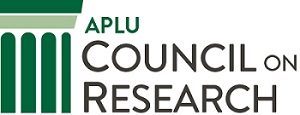
CoR NEWSAugust 10, 2017
To: APLU Council on ResearchFrom: APLU CoR Staff
- CoR Summer Meeting Wrap-Up
- NIH “First In Human” Documentary on Discovery Channel Tonight
- Request for Input to the NAS Next Generation Researchers Initiative Committee
- Call for Nominations to the National Science Board
- Call for Applications for Inaugural University Innovation and Entrepreneurship Showcase
- APLU-AAU Technology Transfer Management Survey Results
- APLU Joins Others in Support of Regional Innovation Program
- Associations Comment in Opposition to Reversing Net Neutrality Rules
- Associations Comment on DOE Regulatory Reform
- DOL Releases RFI on Overtime Rule
- Senate Appropriations Committee Approves CJS Bill
Thank you to the 150 CoR Summer Meeting attendees who joined us in Reno in July! Slides are now posted on the 2017 CoR Summer Meeting website, and we continue to accept feedback via the 2017 CoR Summer Meeting Evaluation. Nominations for the CoR Executive Committee Class of 2020 will be accepted through September 15, 2017; please email Sarah Rovito if you would like to nominate a colleague or yourself. Finally, make sure to mark your calendars for the 2017 APLU Annual Meeting on November 12 – 14, 2017 in Washington, D.C. We look forward to seeing many of you there, as we contemplate The Age of Disruption: Navigating, Innovating, and Excelling.
From NIH Director Dr. Francis Collins: For a remarkable journey through the front lines of clinical research, I’d like to invite you to join me in viewing First in Human, which premieres tonight at 9 p.m. ET on the Discovery Channel. This three-part docuseries, to be aired August 10, 17, and 24, provides an unprecedented look inside the NIH Clinical Center here in Bethesda, MD, following four of the many brave patients who’ve volunteered to take part in the clinical trials that are so essential to medical breakthroughs.
The Next Generation Researchers Initiative Committee of the National Academies of Sciences, Engineering, and Medicine has issued a letter seeking feedback on actions that universities are taking to improve, incentivize, and sustain transitions to independent research careers as well as the barriers next generation researchers will face in the biomedical and behavioral sciences. The Committee is seeking feedback on four core issues, including level, sources and stability of research funding; scope of grant award and review; training, mentoring, and transparency; and underrepresented populations. Responses are requested by October 1, 2017 and may be submitted via this link.
The National Science Board (NSB, Board) is accepting nominations for the class of 2018-2024 until September 8, 2017. Every two years, the Board solicits recommendations for new members from leading scientific, engineering, and educational organizations, as well as the public. NSB considers all completed nominations and then makes its recommendations to the Administration. The President decides who to appoint to the NSB.
The National Science Foundation (NSF) Act of 1950 created the Board with 24 Members serving 6-year terms. The NSF Director is the ex officio 25th member. The Act confers on the Board the dual responsibilities to oversee the activities of and establish policies for NSF, as well as advise the President and Congress on policy matters related to science and engineering and education in science and engineering. The Board is an oversight and governance board, not an honorary board or an advisory committee. Members must devote considerable time to meet their responsibilities. In its review of candidates, the NSB applies the statutory eligibility requirements and considers demographics, balance among professional fields, active researchers, teachers and administrators, and private for-profit and non-profit representation.
More information and nomination instructions are here. NSB’s “Dear Colleague Letter” provides additional information, including specific topics for which representation is sought in the Class of 2024.
APLU and the American Association of Universities (AAU) will host the inaugural “University Innovation and Entrepreneurship Showcase,” highlighting APLU and AAU university-affiliated startup businesses during the APLU Annual Meeting on November 13 and 14 in Washington, D.C. The showcase will promote the importance of federally-funded university research and demonstrate how university-led entrepreneurial engagement contributes to the innovation economy. In addition to exhibiting at the APLU Annual Meeting, showcase participants will head to Capitol Hill to display their innovation/entrepreneurship work and speak with Members of Congress and Congressional staff. Applications are due by September 7, 2017 and must be submitted via this form. Universities may nominate multiple startups and additional information is available here. Please contact Carina Márquez at cmarquez@aplu.org with questions.
APLU and AAU recently released the results of the 2016 “AAU-APLU Technology Transfer Management Survey.” The survey examined the extent to which member universities have implemented the AAU’s Working Group on Technology Transfer and Intellectual Property and APLU’s Task Force on Managing University Intellectual Property 2015 recommendations regarding the management of intellectual property (IP). Federal- and state-level lawmakers continue to demonstrate a recurring and persistent interest in university technology transfer practices and the 2016 survey results help shed light on the state of development of technology transfer policies on APLU and AAU campuses. The breakdown of the 2016 survey results shows the proportion of universities implementing the recommendations, examples of proactive steps that institutions are taking toward improving their technology transfer management, and recommended next steps for campus technology transfer offices. The survey results may be found here.
On July 21, APLU joined the State Science & Technology Institute and other organizations in sending a letter to leaders of the Senate Appropriations Commerce-Justice-Science Subcommittee urging them to fund the Department of Commerce Regional Innovation (RI) program at $50 million for FY2018, a $33 million increase from FY2017 enacted levels. The letter states that “funding the RI Program at $50 million would support efforts to increase job growth, revitalize the manufacturing industry, and increase American innovation.”
APLU joined a number of higher education and library associations in a comment letter opposing the Federal Communications Commission’s (FCC) Notice of Proposed Rulemaking “Restoring Internet Freedom” which would roll back the 2015 Open Internet rule, commonly known as the net neutrality rules. The comment letter expresses concern with the FCC’s efforts to reverse the current net neutrality rules that now protect the openness of the internet. The letter reiterates the need for strong, enforceable net neutrality policies and rules to protect and promote an open Internet, which is inextricably intertwined with the public interest missions of libraries and institutions of higher education. Further, it emphasizes that an open internet is essential for research, education and other public interests served by libraries and higher education institutions. These comments reinforce previous association statements on network neutrality.
On July 14, APLU, the Association of American Universities (AAU), and the Council on Governmental Relations (COGR) sent a letter to the Department of Energy (DOE) in response to a request for comments on DOE’s regulations, paperwork requirements and other regulatory obligations as part of the agency’s implementation of Executive Order 13771, “Reducing Regulation and Controlling Regulatory Costs.”
On July 26, the Department of Labor (DOL) published a much awaited “Request for Information” (RFI) related to the 2016 rule on “white collar” exemptions to the Fair Labor Standards Act overtime requirements in the Federal Register. The RFI comes as the 2016 rule remains under a federal court imposed injunction. Among other changes, the overtime rule would raise the minimum salary threshold for exempt positions from $23,660 to $47,476. APLU joined a number of higher education associations in submitting comments to the proposed rule in 2015 and engaged the Obama administration at high levels to express concerns with the impact on higher education.
The RFI, which has a 60 day comment period and asks for specific feedback in response to 10 questions, begins a DOL process which is likely to result in revisions to the regulation. APLU will be actively engaged throughout the process in partnership with other higher education associations, and feedback from APLU members will be critical to help guide our response.
On July 27, the Senate Appropriations Committee approved its FY2018 Commerce-Justice-Science (CJS) Appropriations bill. The bill would fund the National Science Foundation (NSF) at $7.311 billion, $161 million less than FY2017 enacted funding levels, and $29 million less than the House Committee bill, but $658 million more than the President’s Budget Request (PBR).
The bill would provide funding for basic research across scientific disciplines to support STEM programs, including $160 million for the NSF Established Program to Stimulate Competitive Research (EPSCoR), consistent with FY2017 funding levels and $60 million above the PBR, and $105 million for the design and construction of three Regional Class Research Vessels (RCRV) instead of the two RCRVs, as proposed by NSF. The Senate bill would also fund NSF Research and Related Activities at $5.92 billion, $116 million less than the House, and $556 million above the PBR.
The National Aeronautics and Space Administration (NASA) Science Mission Directorate would be funded at $5.572 billion, $193 million below FY2017 enacted levels and $140 million less than the PBR. Space Technology would receive $700 million, $13 million more than FY2017, $13 million more than the House bill, and $21 million more than the PBR. The funding for the Space Technology would include $130 million for RESTORE-L.
The Space Grant Program is funded at $40 million, the same as the House bill, and flat when compared to FY2017. The president’s budget request proposes to eliminate the NASA Office of Education, which includes Space Grant.
The National Oceanic and Atmospheric Administration (NOAA), Oceanic and Atmospheric Research would be funded at $519 million, a decrease of $5 million from FY2017 enacted levels, $44 million more the House bill proposes, and $169 million more than the PBR.
Sea Grant would be funded at $76.5 million, $4 million more than FY2017 and $6.5 million more than the House bill. The PBR would eliminate the program. The Senate CJS report states the Committee “flatly rejects” the administration’s proposal to eliminate Sea Grant and provides an increase for the program to support its critical activities that “benefit the entire nation.”
The bill proposes $130 million for the National Institute of Standards and Technology (NIST) Manufacturing Extension Program (MEP), consistent with FY2017 enacted levels, and $30 million more than the House bill. The PBR would eliminate the program.
During the Committee mark-up, Senator Jean Shaheen (D-NH) offered an amendment to increase the allocation for the CJS appropriation bill by $6.5 billion, if there is a bipartisan budget agreement on future funding levels. Under these circumstances, the amendment would have increased funding for a number of CJS agencies and programs, including $3.37 billion for the creation of new jobs through increased support for STEM training/workforce programs and scientific research, $538 million to increase funding for NSF and to keep NASA Science at FY2017 funding levels, and funding for 10 new manufacturing hubs. Senator Shaheen’s amendment failed by a vote of 15-16.
The APLU FY2018 Appropriations priorities chart is updated to reflect this House and Senate activity.




Stay Connected
X (formerly Twitter)
Facebook
YouTube
LinkedIn
RSS